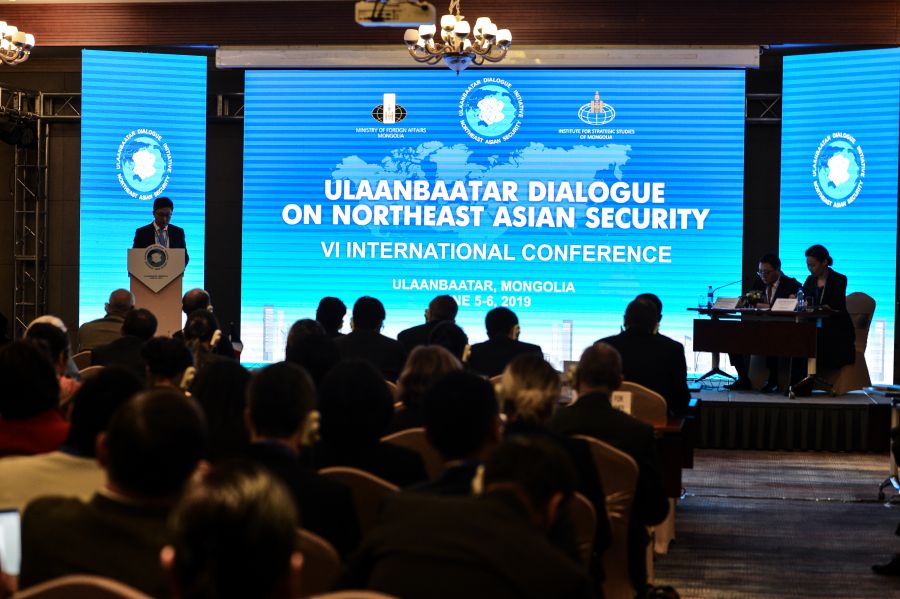Strengthening Regional Stability Through the Ulaanbaatar Dialogue
 Mongolia strives to contribute toward strengthening global peace and stability through its active role in multilateral cooperation including the UN, Asia-Europe Meeting, Organization for Security and Co-operation in Europe and ASEAN (Association of Southeast Asian Nations)-led mechanisms.
Mongolia strives to contribute toward strengthening global peace and stability through its active role in multilateral cooperation including the UN, Asia-Europe Meeting, Organization for Security and Co-operation in Europe and ASEAN (Association of Southeast Asian Nations)-led mechanisms.
Mongolia perceives itself as a part of the broader Asia-Pacific region. However, Northeast Asia has been prioritized in the past decade, with the goal of preserving balanced relations with its only two neighbours, China and Russia. Mongolia promotes engagement with countries with shared democratic values, such as the US, Japan and the Republic of Korea (ROK), while maintaining friendly relations with the Democratic People’s Republic of Korea (DPRK).
In 2013, Mongolia initiated a regional platform called the “Ulaanbaatar Dialogue on Northeast Asian Security” (UBD), which engages all the regional countries to find common ground and chart a joint way forward to attain peace and prosperity in the region and beyond. The ultimate goal is to make a tangible contribution toward fostering regional cooperation.
Mongolian participation in the Asia Pacific
Mongolia laid out a strategic vision with its key policy documents, most notably the National Security Concept (2010) and the Foreign Policy Concept (2011). Both documents stressed that Mongolia’s primary focus should be the Asia-Pacific, specifically Northeast Asia, while Central Asia was only mentioned in the Foreign Policy Concept.
Consequently, Mongolia has been seeking to actively participate in ASEAN-led mechanisms. For example, Mongolia became a member of the Council on Security and Cooperation in the Asia-Pacific (CSCAP) in 1996, the ASEAN Regional Forum (ARF) in 1998, and signed the Treaty of Amity and Cooperation in Southeast Asia in 2005. By joining those mechanisms, Mongolia was given an opportunity to be part of the regional process and to have a better understanding of regional security. In addition, Mongolia expressed its interest to become an ASEAN dialogue partner and joined the East Asian Summit (EAS) in 2015.
Northeast Asian regional security
When it comes to Northeast Asia, we have witnessed many challenges arising from historical and territorial disputes, including the uncertainty on the Korean Peninsula, which remains divided between the US, Japan, and ROK, on one side, and China, Russia and the DPRK on the other. The region has tremendous economic potential yet cannot take full advantage due to mistrust and the lack of a cooperation mechanism.
Given this assessment, Mongolia has opted to pursue a peaceful, multi-faceted foreign policy, with the priority of preserving balanced relations with its only two neighbours, China and Russia. In addition, with its prioritization of Northeast Asia, Mongolia promotes a “third neighbour policy” toward the US, Japan and ROK – countries with shared democratic values – in an effort to diversify relations. Moreover, even as it extends engagement with democratic allies, Mongolia has also been keen to maintain traditionally friendly relations with the DPRK.
Given these challenges in the region, Mongolia perceives its core interests are best served by having a stable regional security environment. Yet Mongolia does have an important advantage when it comes to realizing this goal – specifically, it enjoys friendly relations with all Northeast Asian countries. Indeed, it has no territorial or unresolved disputes and, unlike some of them, it also enjoys an unabashed nuclear weapon-free status.
From Active Participant to Initiator
Taking advantage of its unique position, Mongolia has been actively supporting the efforts of regional countries in strengthening stability in Northeast Asia and the wider region, not least through the UBD.
Mongolia has been pressing for all Northeast Asian countries to fully participate in the UBD in an effort to foster mutual understanding, build trust and confidence and promote regional cooperation, with the goal of using UBD to serve as an institutional mechanism of dialogue in Northeast Asia. The UBD has already become an inclusive process since 2017, bringing together decision-makers, government officials, academics and civil society to address both traditional and non-traditional challenges simultaneously.
Mongolia proposed the initial idea of creating a security dialogue in Northeast Asia in the early 1980s and studied the possibility of an official dialogue in 2000, which led to a conference under the theme “Security Perspectives of Central and Northeast Asia: Ulaanbaatar as a New Helsinki” organized by the Institute for Strategic Studies in 2008.
The Ministry of Foreign Affairs and the Institute for Strategic Studies of the National Security Council have been organizing the UBD on Northeast Asian security international conferences annually since 2014. However, due to the pandemic, the UBD conference was cancelled in 2020.
Future ahead
Drawing from the experience from the successful confidence building measures (CBMs) in the Helsinki process, UBD has the potential to be expanded beyond the region, with the inclusion of both more relevant topics and the establishment of a Secretariat. Since its inception, after six international conferences, we have accumulated experience in organizing Track 1 or Track 1.5 meetings and co-organizing parallel sessions with international and regional communities with specific topics. Therefore, the UBD must mobilize domestic collaboration for extended platforms on the topics of energy, infrastructure, and humanitarian cooperation, cyber security and women, and youth inclusion through side events.
Related posts:
Category: FOREIGN POLICY & SECURITY, SOUTH ASIA & ASIA PACIFIC

